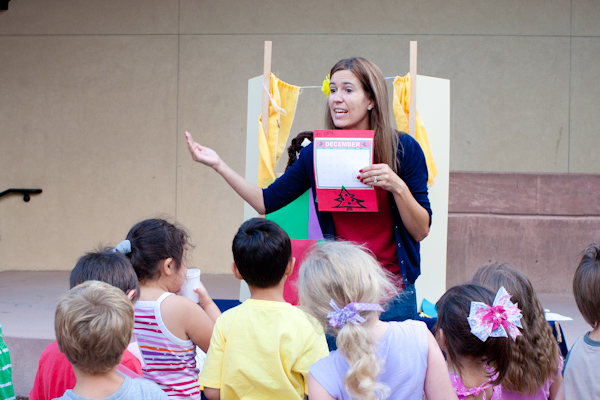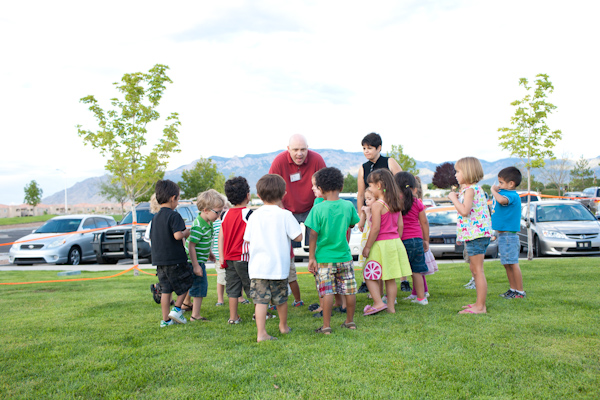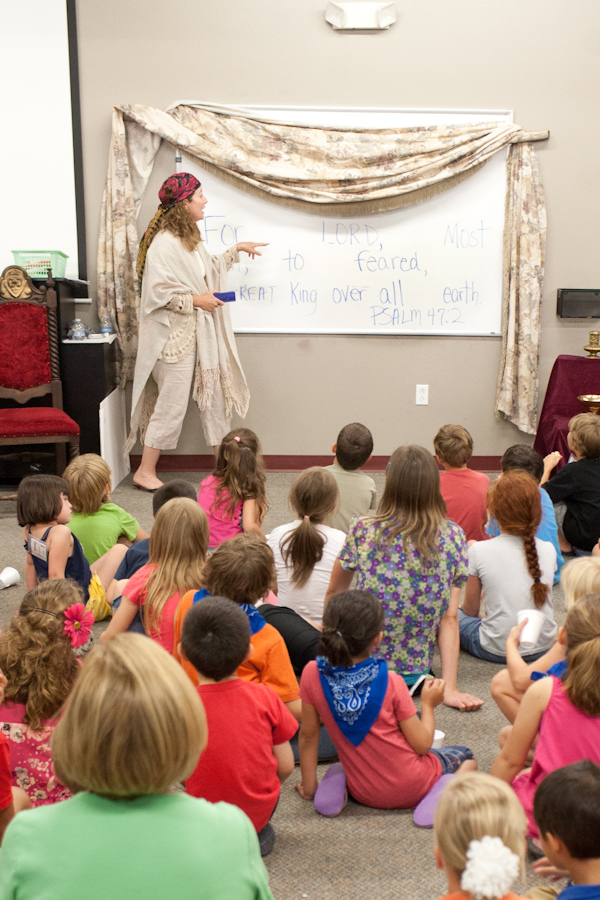Archive for the Gospel Category
Jul 18
A New Album of Children’s Songs for VBS ’12
For a number of years now, children at VBS have gone home with a CD of the songs they sang together that week. With these CDs, children can sing the songs they learn at VBS long after the week is over.
This year’s album of children’s songs was recorded in the studio ahead of VBS, and is especially well done. You will want to hear these songs, so if you are a parent of a child at VBS, look out for this CD in your child’s bag on Friday night.
One of the songs, “Come Let us Worship and Bow Down,” comes right from the text of Psalm 95. So, in praising God with this song the children are actually praising God with the Scripture!
Come let us worship and bow down;
let us kneel before the Lord,
our God, and Maker.For He is our God,
and we are the people of his pasture,
and the sheep of his hand,
just the sheep of his hand.
Other songs on this album include, “Jesus Saves,” “The Day,” “Oh, The Deep, Deep Love of Jesus,” “Only God,” and “Only Elohim.” If some of these songs aren’t already familiar to you, they will become familiar to you if you have a child at VBS this year.
Click here to hear this song. Right click on link for the option to save the song to your computer.
Here are some photos from the first two nights at VBS:
Apr 3
Easter Weekend Services
“He is not here, for he has risen, as he said.”
–Matthew 28:6
Those were the words of an angel to Mary Magdalene and Mary, Jesus’ mother, on the morning of his resurrection. This angel’s “appearance was like lightning, and his clothing white as snow. And for fear of him the guards trembled and became like dead men” (Matthew 28:3-4). But this bright and fearsome angel brought news that would take the fear out of death itself. Jesus Christ was raised from the dead. That is to say, everything that Jesus said about himself was true, and every promise that he claimed to fulfill he really did fulfill. Jesus is the resurrection and the life, and anyone who believes in him will never die (John 11:25).
Please join us this weekend in the worship of Jesus Christ, who was crucified for our sins and raised victorious over death.
We will host a Good Friday service this Friday, April 6, at 6:30 PM. Childcare is available for children 4 years old and younger. Then, our Easter Sunday services will take place on April 8, at 7:30, 9:00, and 10:45 AM, with childcare available for the two later services.
If your situation allows, consider joining us for the 7:30 AM service this Sunday. As a church, we are praying to be joined by numerous friends, neighbors, and family members on Sunday. Arranging to join us at 7:30 AM will help ensure that visitors to our later services feel welcome and have a place to sit, even if they show up a bit late.
Dec 16
Christopher Hitchens (1949-2011)
Christopher Hitchens, a prominent and widely influential atheist, died yesterday. If you aren’t familiar with Hitchens from his book, God is Not Great: How Religion Poisons Everything, then you may know him from TV interviews or articles in any number of magazines.
On the occasion of his death, a few articles are worth reading. Justin Taylor has a helpful reflection at his blog, and Douglas Wilson was asked to reflect on his death for Christianity Today.
Doug Wilson, by the way, was Hitchens’ debate partner in a multi-article debate hosted by Christianity Today in 2007 (Part 1, Part 2, Part 3, Part 4, Part 5, Part 6). That debate was eventually turned into the documentary video, Collision: Is Christianity Good for the World?:
[RSS and email readers, click here to view this video]
We can genuinely hope that Hitchens died in Christ, since we know he heard the gospel many times. That is never impossible if someone has heard, but that is unlikely. Doug Wilson reflects a bit on this in his article. To the question of deathbed conversion, Thomas Gurhrie, a 19th century Scottish preacher has a timely word: “It cannot be too often, or too loudly, or too solemnly repeated, that the Bible, which ranges over a period of four thousand years, records but one instance of a death-bed conversion—one that none may despair, and but one that none may presume.†(chapter 1 of Early Piety).
Christopher Hitchens was deeply impassioned about the non-existence of God. It really does seem, though, like he really was debating against something, or Someone, instead of nothing. And we believe that he was. How much more should those of us who know the True and Living God be known for our loving, impassioned, and authoritative persuasion with the gospel.
HT: JT
Dec 8
Who Does David Think He Is?
Reading through the Psalms, you might ask yourself this question from time to time.
For example, several weeks ago in his sermon, “The Lord is My Rock,” Ryan preached from Psalm 18, where David writes:
The LORD dealt with me according to my righteousness; according to the cleanness of my hands he rewarded me. For I have kept the ways of the LORD, and have not wickedly departed from my God. For all his rules were before me, and his statutes I did not put away from me. I was blameless before him, and I kept myself from my guilt. So the LORD has rewarded me according to my righteousness, according to the cleanness of my hands in his sight. – Psalm 18:20-24
Twice here David says he is righteous, and that his hands are clean. Once is already one too many times for those who accept the biblical doctrine of sin. We aren’t righteous. We don’t have clean hands.
So, what’s going on here?
If we were to sit down with David and ask him to explain what he meant, what would he say?
One way to get an answer to that is to look at the other things he has said.
First, as Ryan pointed out, David knows he is a great sinner.
There are plenty of places where David confesses great sin. Psalm 14, 32, and 51, for example, reveal the depth of David’s self-understanding as a rebel in God’s world. In Psalm 143:2, he says clearly, “no one living is righteous before you.” With that clarification, a clear takeaway from David’s reflection in Psalm 18 is to say that God loves and, indeed, God rewards obedience. Inasmuch as David was obedient, God was pleased to reward David, even if this isn’t all there is to say about David or God’s dealings with him or us.
But there is more to see from David’s own writing.
Second, David knows where any human goodness or greatness comes from: God!
This comes out beautifully in his prayer in 1 Chronicles 29:10-14:
Therefore David blessed the Lord in the presence of all the assembly. And David said: “Blessed are you, O Lord, the God of Israel our father, forever and ever. Yours, O Lord, is the greatness and the power and the glory and the victory and the majesty, for all that is in the heavens and in the earth is yours. Yours is the kingdom, O Lord, and you are exalted as head above all. Both riches and honor come from you, and you rule over all. In your hand are power and might, and in your hand it is to make great and to give strength to all. And now we thank you, our God, and praise your glorious name. But who am I, and what is my people, that we should be able thus to offer willingly? For all things come from you, and of your own have we given you.â€
In his helpful article, “Who Owns Greatness?,” our friend, Fred Zaspel, helps us to see the significance of David’s words in this passage and on this subject. I’ll quote a large portion of the article here, though the whole piece is worth reading:
The gist of David’s praise is clear enough — God rules over all in greatness, power, glory, victory, and unrivaled majesty. But notice that David’s thinking goes much deeper than just that. He does not say that God is great. He says that greatness belongs to God. He does not say that God is majestic. He says that majesty belongs to God. “Yours, O Lord, is the greatness and the power,†and so on. It is one thing to say that God is great, but it is quite another step to acknowledge that greatness itself — all greatness — is his. That is to say, whatever greatness we see in this world is a borrowed greatness, on loan from God. Whatever power there is, it is a power that comes from God. It is all his. And whatever measure of greatness we have — physical, moral, political, societal, financial — we have it because God has condescended to share it with us. “Both riches and honor come from you,†David says, because it is all his to begin with.
We need to learn this well. It is a massively humbling truth: the more we do for God the more we are indebted to God for the honor of it. I can take no credit for any measure of greatness or goodness I may possess, for it is all a gift from God.
Having recognized all this David takes the inevitable next step of worship. He prays that God will continue to show this favor to his people, and keep their hearts for himself. “O Lord, the God of Abraham, Isaac, and Israel, our fathers, keep forever such purposes and thoughts in the hearts of your people, and direct their hearts toward you. Grant to Solomon my son a whole heart that he may keep your commandments, your testimonies, and your statutes, performing all, and that he may build the palace for which I have made provision” (1 Chronicles 29:18-19).
So, God does reward obedience. But at the end of the day, our obedience and, thus, God’s favor is not a credit to our own greatness, but to the God of all greatness. David gets that. God is great in Himself and is the source of any greatness we find in the world, or any greatness that we ourselves possess.
Finally, David knows that God will provide a son who will eclipse him in greatness and wholehearted obedient to God.
He wouldn’t have been able to speak about Christ with the kind of clarity that we have from our position. Indeed, Peter tells us that the prophets “searched and inquired carefully” to understand where exactly all of God’s promises were pointing (1 Peter 1:10). David was in that boat.
But threaded through David’s prayers is the expectation of a messiah to come. Sometimes that expectation is pronounced and glowing. Sometimes it shows up in confessions of what God requires that show us David’s desire, but also his own inadequacy as God’s king. He is not God’s ultimate solution. In Hebrews 10:5-10 the author of Hebrews made this connection when he quoted David from Psalm 40, writing about Christ:
When Christ came into the world, he said, “Sacrifices and offerings you have not desired, but a body have you prepared for me; in burnt offerings and sin offerings you have taken no pleasure. Then I said, ‘Behold, I have come to do your will, O God, as it is written of me in the scroll of the book.’†When he said above, “You have neither desired nor taken pleasure in sacrifices and offerings and burnt offerings and sin offerings†. . .then he added, “Behold, I have come to do your will.†He does away with the first in order to establish the second. And by that will we have been sanctified through the offering of the body of Jesus Christ once for all.
As Christians, we can thank God that He rewards obedience, and we can thank Him for providing the obedience He requires of us in Christ.
Jesus is our obedient King. He was obedient to his Father’s will in everything, unlike us. And he was obedient to his Father’s will in everything for us, “to the point of death, even death on a cross,” (Philippians 2:8). In Christ, we inherit the reward for the obedience that Christ performed.
As we read the Psalms and learn to pray them together, it’s good to know who we’re listening to and to know who these writers think they are. David knows he’s a sinner, that his greatness is from God, and that God’s promise to save His people rests on God’s own faithfulness to fulfill His Word.
With Christmas in mind, it’s good to know who we’re celebrating and what we’re proclaiming: the one with clean hands and a righteous life, who gives to those who believe in him the reward for both.
Dec 6
“Who is Jesus?” A Good Time for an Important Question
If there is a month in the year that invites this question, December is it.
We want a clear answer to that question for ourselves, of course. But we want to be able to answer that question clearly for others, and especially those who are asking that question seriously for the first time.
Here are some suggestions for how to bring Christ to our family, friends, and neighbors during Christmas:
First, get clear on what the Scripture says about Christ and what He came to do.
One place get a quick and helpful summary of Jesus’ person and work is our new “Who is Jesus?” page, recently added with the refresh of the website. This was written primarily with the curious unbeliever in mind, but being clear on the identity and work of Jesus Christ is certainly important for our daily Christian life, and for our communication of the gospel. Print it out. Mark it up. Look up verses. Meditate. And pray for a chance to answer the question Who is Jesus?
Second, pray for God to provide a door for the gospel and an ask others to join you in praying for the same.Â
In Paul’s letters we find this kind of “prayer request” a regular thing. Paul asked the Colossian church, “pray also for us, that God may open to us a door for the word, to declare the mystery of Christ” (4:3). And in his letter to the church at Ephesus, he wrote, “[pray] for me, that words may be given to me in opening my mouth boldly to proclaim the mystery of the gospel, for which I am an ambassador in chains, that I may declare it boldly, as I ought to speak.” So, pray for a door for the gospel, for the spiritual alertness to see it, and the boldness to walk through it.
Third, pick up a Christmas Servies Invitation Card, and invite a friend to church.
This year Christmas falls on a Sunday. That means we have a full Christmas weekend coming up. Our Christmas Eve services will be at 4:00 PM and 6:00 PM on Saturday night, December 24. Our Sunday services will be at the regular times. And, of course, that Christmas is on a Sunday is a treat for those who know why it is that Jesus was born: the resurrection of Jesus Christ from the dead. It’s also a time where people are more open to visiting a church than at other times of the year. So, pick up or download our Christmas Services Invitation Card and email or pass it along.
Fourth, pick up a copy of Bringing the Gospel Home, by Randy Newman.
As the subtitle helpfully describes, this book is about “Witnessing to Family Members, Close Friends, and Others Who Know You Well.” This book is available at the Resource Center, and is offered now as a free download from Crossway Books. We posted a blog with a video about this book a number of months ago, so if this recommendation peaks your interested, revisit that post.
Fifth, browse our titles at the Resource Center for possible gifts.
Last week we posted a list of resources being featured at the Resource Center this month. Some may be a match for someone you know. Review the list or stop by during the week or on a Sunday.













